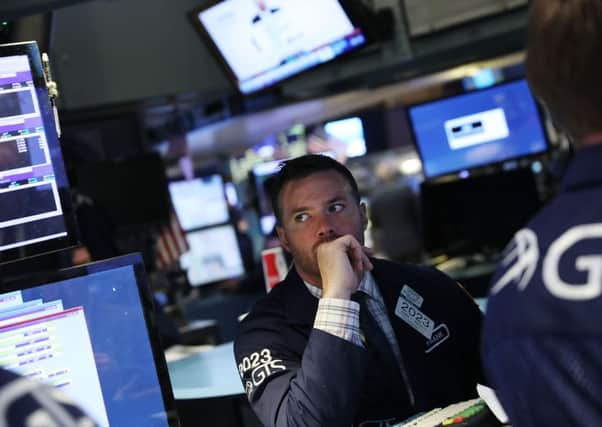How should investors weather the Brexit storm?


Money has flowed out of stock market funds as investors have sought shelter in assets including cash, gold and corporate bonds.
The flight to safety slowed towards the end of the week, but with the UK facing ongoing political instability, hit by ratings downgrades and widely predicted to enter recession, there are uncertain times ahead for investors, including millions of people saving into Isas and pensions.
Advertisement
Hide AdAdvertisement
Hide AdWe asked a few of Scotland’s leading investment commentators for their views on what lies in store:
Andrew Milligan, head of global strategy, Standard Life Investments
Let us step back from the recent turmoil. For some time our “house view” has favoured what we call “sustainable yield”, benefiting from the income which corporate bonds, equity and real estate can give us in a world of low growth, inflation and interest rates.
This view is clearly boosted by the referendum outcome, although the definition of what is sustainable will change as business models are forced to evolve. The implications of Brexit will ricochet through the UK and global economy for years to come.
We continue to like corporate bonds, as we expect global yields to remain lower for longer against the backdrop of future rate cuts. Within equities stock picking is key, as a number of stocks now look rather expensive. Whether you should hold large FTSE 100 companies or medium-sized FTSE 250 companies very much depends on the future path for sterling, and we are cautious on the pound in view of the UK’s large current account deficit.
We already preferred European and US real estate to UK, and the outlook for property demand in London only supports such a view. Dealing with uncertainty is not easy – holding cash awaiting good buying opportunities and having a diversified range of funds and stocks is common sense. For those with time, scenario analysis is essential in this complex politicised world.
William Forsyth, investment manager and principal at Charlotte Square Investment Managers
Current volatility suggests that detailed knowledge is required when building a bespoke portfolio at present. It looks unlikely that there will be any sudden reversal in the decline in the value of sterling since the referendum. Does this mean that all the early beneficiaries will prosper? With the technology changes faced by the energy sector it might be an idea to realise holdings here, despite US dollar earnings currently re-rating share prices.
Advertisement
Hide AdAdvertisement
Hide AdBrand leaders such as Diageo and Pernod look to have more sustainable models; the same is true for consumer product leader Reckitt Benckiser, with brands like Dettol.
UK companies with a technology edge will help reduce costs in areas like the NHS and niche market leaders on the alternative investment market have the benefit of potential IHT (inheritance tax) relief after two years.
With talk of US interest rate rises again being deferred it seems sensible to hunt out stocks with an income bias, though with likely limited capital growth potential. These bond proxies can offer yields of around 5 per cent but require careful selection.
It was instructive that in the sell-off this week investment property companies fared less well than infrastructure and corporate bond funds.
Alan Steel, chairman of Alan Steel Asset Management
Stock markets don’t like surprises. Which shows they are anything but as efficient as many theorists still believe. That’s because our neolithic brains are wired for survival, by panicking. And collectively, we make the market.
Is what happened after the referendum unusual relative to history? No, it was a classic response – panic, then volatility. So what was the best course of action after the crashes of 1973, 1984, 1987, 1998, 2000 and 2008?
1) Stop watching the telly, reading headlines and doing what the herd does.
2) Put an array of equity income funds in your portfolio and hold them for the long term, whether you need growth or income.
Advertisement
Hide AdAdvertisement
Hide Ad3) Concentrate on portfolio defence first, with funds such as the Trojan from Troy Asset Management. This “crisis” is not likely to be over soon despite the market recovery since Tuesday.
Let’s face it, what do you do instead? Holding deposits makes no sense because you don’t earn anything. Gilts? No way, unless you fancy losing capital over a decade of being locked into negative returns. Property? Too expensive and illiquid.
In pensions drawdown? Be very careful not to draw out high “income” when markets fall. That would be disastrous for your fund.
Other thoughts? The days of lazy UK index tracking are long gone. As for the huge flow into “absolute return” funds, that’s a mug’s game. The next five years belongs to hard-working, contrarian, thinking, active managers like Neil Woodford (Woodford Asset Management) and Terry Smith (Fundsmith).
Alec Stewart, chief executive at Anderson Strathern Asset Management
With the possibility of a Leave vote in mind, we retained large positions in UK and global multinational companies in our portfolios, as we believe the truly international nature of their businesses will offer some insulation from any uncertainty resulting from the referendum result. Diversifying portfolios across different asset classes should also provide some stability. In particular, overweight positions in international equities relative to UK equities, corporate credit, “direct” property and absolute return vehicles should prove less sensitive to short-term market movements.
We continue to believe that government bonds look expensive (ever more so) on a medium/long-term basis. At current valuations, government bond positions look increasingly less compelling.
Market reactions can be emotional and therefore extreme in the very short run. It is time to see beyond the “white noise”. Inevitably, the devil will be in the detail and, as ever, volatility creates exciting and interesting opportunities across a number of asset classes, regions and sectors. Long-term objectives can only be met with long-term solutions. That cannot change.